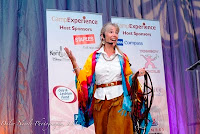My Horse Agrees with Author D.H. Lawrence
 |
| On stage for a "Page Wisdom" segment at CampExperience 2011 |
My great religion is a belief in the blood, the flesh, as being wiser than the intellect. We can go wrong in our minds. But what our blood feels and believes and says, is always true. The intellect is only a bit and a bridle.
I like this quote from D.H. Lawrence (Lady Chatterly's Lover). When I get on my horse's back, he reminds me that we do best as a team if I ease up on the reins, and quit pulling on his head. Farside responds more quickly to gentle leg pressure around his center, his girth - when the calf of my left leg is close to his heart, that blood-pumping organ that propels us literally and metaphorically.
 |
| Page's daughter riding Farside with halter and loose lead rope |
Last weekend, at the 2011 CampExperience retreat, I asked the 240 women in the audience to stand up, grab a partner, and try to lead each other around by the head. Mayhem ruled until they switched their hands from their partner's head, to the middle, the core. Our bodies like balanced, centered movement. I think we like our stories that way, too.
Letting our hearts guide us as we move through each day is a good motto for life. Not that we should ignore the intellect, but too often we ignore the physical sensations the natural world sends us to inform each moment.
Good storytellers know how to engage the reader's sensory recall. With a few carefully chosen descriptive words, they tap into the reader's cellular memory bank and a scene comes alive. But what happens when we try to guide the characters in our stories with our intellect, rather than letting our "writing" heart lead us to what a character's heart would be feeling?
What happens if we construct a plot outline, or a scene, without allowing our gut instincts to inform the process, and what is "gut instinct" anyway? The Solar Plexus - that ganglia of sympathetic nerves found below the sternum and above the diaphragm - is sometimes called our Primitive Brain.
In From Where You Dream, Robert Olen Butler begins Chapter 4 (The Cinema of the Mind) with this Pablo Picasso quote:
If only we could pull out our brains, and use only our eyes.
Dr. Christiane Northrup, in her book Women's Bodies, Women's Wisdom, claims that the "mind" and the "brain" are two different things, asking us to ponder the idea that the mind is in every cell of our body.
Next time I climb on my horse's back, or sit in the center of a story-in-progress, maybe I should try writing what my body "sees," instead of writing what my intellect "thinks." Maybe I should toss aside that bit and bridle and listen to what my gut is telling me.
NOTE: November 5, 2011, Page will be teaching a one-day workshop, THE YEARNING FACTOR, inspired by Butler's book From Where You Dream: The Process of Writing Fiction.




Comments